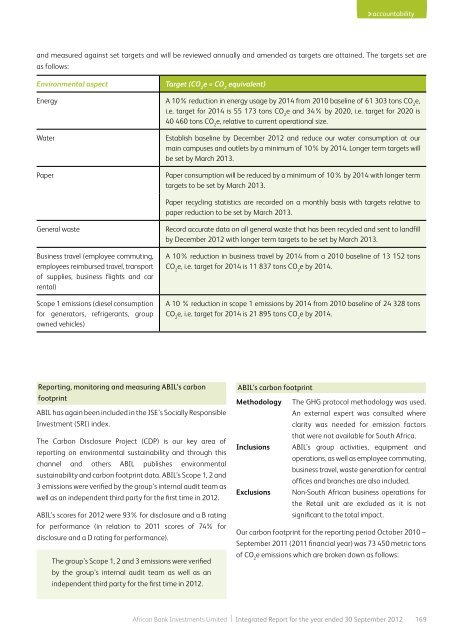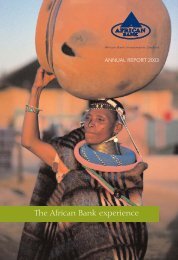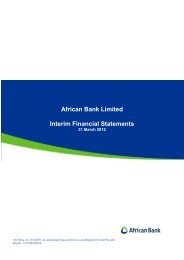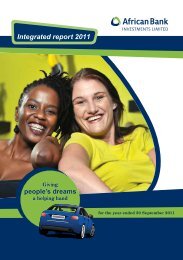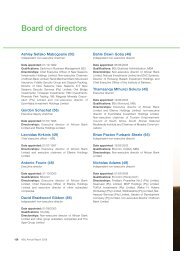Full annual report - African Bank - Investoreports
Full annual report - African Bank - Investoreports
Full annual report - African Bank - Investoreports
You also want an ePaper? Increase the reach of your titles
YUMPU automatically turns print PDFs into web optimized ePapers that Google loves.
accountability<br />
and measured against set targets and will be reviewed <strong>annual</strong>ly and amended as targets are attained. The targets set are<br />
as follows:<br />
Environmental aspect Target (CO 2 e = CO 2 equivalent)<br />
Energy A 10% reduction in energy usage by 2014 from 2010 baseline of 61 303 tons CO 2 e,<br />
i.e. target for 2014 is 55 173 tons CO 2 e and 34% by 2020, i.e. target for 2020 is<br />
40 460 tons CO 2 e, relative to current operational size.<br />
Water Establish baseline by December 2012 and reduce our water consumption at our<br />
main campuses and outlets by a minimum of 10% by 2014. Longer term targets will<br />
be set by March 2013.<br />
Paper Paper consumption will be reduced by a minimum of 10% by 2014 with longer term<br />
targets to be set by March 2013.<br />
Paper recycling statistics are recorded on a monthly basis with targets relative to<br />
paper reduction to be set by March 2013.<br />
General waste Record accurate data on all general waste that has been recycled and sent to landfill<br />
by December 2012 with longer term targets to be set by March 2013.<br />
Business travel (employee commuting,<br />
employees reimbursed travel, transport<br />
of supplies, business flights and car<br />
rental)<br />
Scope 1 emissions (diesel consumption<br />
for generators, refrigerants, group<br />
owned vehicles)<br />
Reporting, monitoring and measuring ABIL’s carbon<br />
footprint<br />
ABIL has again been included in the JSE’s Socially Responsible<br />
Investment (SRI) index.<br />
The Carbon Disclosure Project (CDP) is our key area of<br />
<strong>report</strong>ing on environmental sustainability and through this<br />
channel and others ABIL publishes environmental<br />
sustainability and carbon footprint data. ABIL’s Scope 1, 2 and<br />
3 emissions were verified by the group’s internal audit team as<br />
well as an independent third party for the first time in 2012.<br />
ABIL’s scores for 2012 were 93% for disclosure and a B rating<br />
for performance (in relation to 2011 scores of 74% for<br />
disclosure and a D rating for performance).<br />
The group’s Scope 1, 2 and 3 emissions were verified<br />
by the group’s internal audit team as well as an<br />
independent third party for the first time in 2012.<br />
A 10% reduction in business travel by 2014 from a 2010 baseline of 13 152 tons<br />
CO 2 e, i.e. target for 2014 is 11 837 tons CO 2 e by 2014.<br />
A 10 % reduction in scope 1 emissions by 2014 from 2010 baseline of 24 328 tons<br />
CO 2 e, i.e. target for 2014 is 21 895 tons CO 2 e by 2014.<br />
ABIL’s carbon footprint<br />
Methodology The GHG protocol methodology was used.<br />
An external expert was consulted where<br />
clarity was needed for emission factors<br />
that were not available for South Africa.<br />
Inclusions ABIL’s group activities, equipment and<br />
operations, as well as employee commuting,<br />
business travel, waste generation for central<br />
offices and branches are also included.<br />
Exclusions Non-South <strong>African</strong> business operations for<br />
the Retail unit are excluded as it is not<br />
significant to the total impact.<br />
Our carbon footprint for the <strong>report</strong>ing period October 2010 –<br />
September 2011 (2011 financial year) was 73 450 metric tons<br />
of CO e emissions which are broken down as follows:<br />
2<br />
<strong>African</strong> <strong>Bank</strong> Investments Limited | Integrated Report for the year ended 30 September 2012 169


